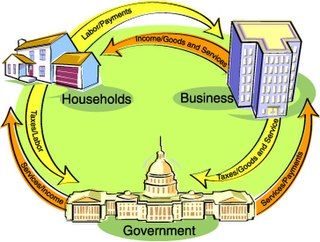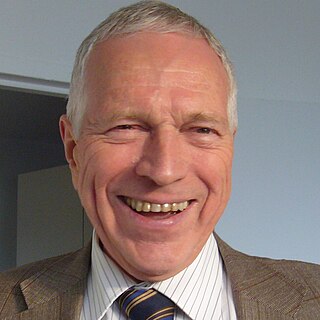
Leonce Ndikumana, is a Burundian Professor of Economics and specialist in African economy development, macroeconomics, external debt and capital flight.

Leonce Ndikumana, is a Burundian Professor of Economics and specialist in African economy development, macroeconomics, external debt and capital flight.
He got his bachelor's degree in economics at the University of Burundi in 1986. [1] He became a lecturer in 1987 and finally Director of Finance and Administration at the same university. In 1992, he got a Masters in Economics and in 1996 his doctorate at the Washington University in St. Louis, USA. He is currently Distinguished Professor of Economics and Director of the Africa Development Program at the Institute of Research at Political Economy Research Institute (PERI) at the University of Massachusetts, Amherst in the United States.
Ndikumana is particularly interested in the macro-economic policy and in Africa economy. [2] He focuses his career on the causes of weak African economies, its consequences and solutions needed. [3] He is a member of the United Nations Development Policy Committee. He served as Director of Research and Operations of the African Development Bank (2008–2011), [4] and Head of macroeconomic analysis at the United Nations Economic Commission for Africa (UNECA or Economic Commission for Africa), Addis Ababa, Ethiopia from 2006 to 2008. He specializes on external debt and capital flight, financial markets and growth, and macroeconomic policies for growth and employment with a focus on the Africa. [5] [6]
Léonce Ndikumana career focuses primarily on African economy development, macroeconomic theory, and money and banking. It examines the extent, causes and effects [5] the flight of capital from African countries. [7] [8] He has co-written with James K Boyce research published in several journals: International Review of Applied Economics, African Development Review, [9] Development and Change, Journal of Development Studies [10] and World Development. His préoccupations on macroeconomics are also published in journals such as American Economic Review, [11] Journal of Post Keynesian Economics, and Journal of African Economies. [12]
Ndikumana is also author of several works. [13] [14] [15] [16] In La dette odieuse de l’Afrique [17] (Amalion, 2013), co-written with James K. Boyce, Ndikumana reveals that, contrary to popular perception that Africa depends on financial resources of the West, [18] the continent is actually a net creditor to the rest of the world. [19]
This section needs additional citations for verification .(November 2017) |

Robert Emerson Lucas Jr. is an American economist at the University of Chicago, where he is currently the John Dewey Distinguished Service Professor Emeritus in Economics and the College. Widely regarded as the central figure in the development of the new classical approach to macroeconomics, he received the Nobel Prize in Economics in 1995 "for having developed and applied the hypothesis of rational expectations, and thereby having transformed macroeconomic analysis and deepened our understanding of economic policy". He has been characterized by N. Gregory Mankiw as "the most influential macroeconomist of the last quarter of the 20th century." As of 2020, he ranks as the 11th most cited economist in the world.
Capital flight, in economics, occurs when assets or money rapidly flow out of a country, due to an event of economic consequence or as the result of a political event such as regime change or economic globalization. Such events could be an increase in taxes on capital or capital holders or the government of the country defaulting on its debt that disturbs investors and causes them to lower their valuation of the assets in that country, or otherwise to lose confidence in its economic strength.

Thomas John Sargent is an American economist and the W.R. Berkley Professor of Economics and Business at New York University. He specializes in the fields of macroeconomics, monetary economics, and time series econometrics. As of 2020, he ranks as the 29th most cited economist in the world. He was awarded the Nobel Memorial Prize in Economics in 2011 together with Christopher A. Sims for their "empirical research on cause and effect in the macroeconomy".
János Kornai was a Hungarian economist noted for his analysis and criticism of the command economies of Eastern European communist states. He also covered macroeconomic aspects in countries undergoing post-Soviet transition. He was emeritus professor at both Harvard University and Corvinus University of Budapest. Kornai was known to have coined the term shortage economy to reflect perpetual shortages of goods in the centrally-planned command economies of the Eastern Bloc.

Edmund Strother Phelps is an American economist and the recipient of the 2006 Nobel Memorial Prize in Economic Sciences.

Lars Peter Hansen is an American economist. He is the David Rockefeller Distinguished Service Professor of economics at the University of Chicago and a 2013 recipient of the Nobel Memorial Prize in Economics.

Stephen Alvin Resnick was an American heterodox economist. He was well known for his work on Marxian economics, economic methodology, and class analysis. His work, along with that of Wolff, is especially associated with a post-Marxist and post-Althusserian perspective on political economy.
Charles Chukwuma Soludo, CFR is a Nigerian economics professor and a former governor and chairman of the board of directors of the Central Bank of Nigeria (CBN). Chukwuma was named governor on 29 May 2004. He is also a member of the British Department for International Development's International Advisory Group.
Kingsley Y. Amoako is a Ghanaian international civil servant with a five-decade career in African development. He is a thought leader on policies and initiatives of governance and growth on the continent, and he has worked alongside development specialists to address African and global development issues.
David Hibbard Romer is an American economist, the Herman Royer Professor of Political Economy at the University of California, Berkeley, and the author of a standard textbook in graduate macroeconomics as well as many influential economic papers, particularly in the area of New Keynesian economics. He is also the husband and close collaborator of Council of Economic Advisers former Chairwoman Christina Romer.

Nemat Talaat Shafik, Baroness Shafik,, known as Minouche Shafik, is an Egyptian-born British-American economist who has been serving as the Director of the London School of Economics since September 2017.
Basil John Moore was a Canadian post-Keynesian economist, best known for developing and promoting endogenous money theory, particularly the proposition that the money supply curve is horizontal, rather than upward sloping, a proposition known as horizontalism. He was the most vocal proponent of this theory, and is considered a central figure in post Keynesian economics

The African School of Economics (ASE) is a private university headquartered in Abomey-Calavi, Republic of Benin.
Rigobert Roger Andely, is a Congolese central banker and academic specializing in monetary and banking economics. He was Vice-Governor of the Bank of Central African States (BEAC) from 1998 to 2002, Minister of Finance in the government of Congo-Brazzaville from 2002 to 2005, and Vice-Governor of the BEAC again from 2005 to 2010.
Roger Edward Alfred Farmer is a British/American economist. He is currently a Professor at the University of Warwick and is a Distinguished Emeritus Professor and former Chair of the Economics department at the University of California, Los Angeles. He has also held positions at the University of Pennsylvania, the European University Institute and the University of Toronto. He is a Fellow of the Econometric Society, Research Associate of the National Bureau of Economic Research, and Research Fellow of the Centre for Economic Policy Research, and the former Research Director of the National Institute of Economic and Social Research (NIESR). In 2013, he was the Senior Houblon-Norman Fellow at the Bank of England. He is internationally recognized for his work on self-fulfilling prophecies. Farmer has published several scholarly articles in leading academic journals. He is also a co-founder of the Indeterminacy School in Macroeconomics. His body of work has advanced the view that beliefs are a new fundamental in economics that have the same methodological status as preferences, technology, and endowments. In his 1993 book, Macroeconomics of Self-fulfilling Prophecies, he argues that beliefs should be modeled with the introduction of a Belief Function, which explains how people form ideas about the future based on things they have seen in the past. In his 2010 book, Expectations, Employment and Prices, he suggests an alternative paradigm to New Keynesian economics which reintroduces a central idea from John Maynard Keynes' The General Theory of Employment, Interest and Money; that high involuntary unemployment can persist as a permanent equilibrium outcome. He provided an accessible introduction to these ideas in his 2010 book How the Economy Works, and more recently, in his 2016 book Prosperity for All, both of which were written for a general audience. The Farmer Monetary Model has different and high policy implications and relevance. Farmer's policy proposal to achieve full employment by controlling and stabilizing asset prices shows promise as a way to help prevent stock market crashes and deep recessions. His son is the economist Leland Edward Farmer, who joined the faculty at the University of Virginia in July 2017.
Amalion is a multilingual independent academic publishing house based in Dakar, Senegal.
Robert A. Blecker is an American economist who is currently a Professor in the Department of Economics at American University in Washington, DC. He is also Affiliate Faculty of the American University School of International Service and Center for Latin American and Latino Studies, and a Research Associate at the Economic Policy Institute and Political Economy Research Institute. His research has made contributions to the fields of post-Keynesian and neo-Kaleckian macroeconomics, open economy macroeconomics, international trade theory and policy, global imbalances and the U.S. trade deficit, the North American Free Trade Agreement, the economy of Mexico, export-led growth, and the theory of balance-of-payments constrained growth.

Felwine Sarr is a Senegalese academic, musician and writer of novels and cultural essays, born in Sine Saloum, Niodior Arrondissement. He studied Economics and taught this subject at the Gaston Berger University (Senegal) until his move in 2020 as Research Professor in the Department of Romance Studies at Duke University in the United States.
Kaba Nialé is an Ivorian politician who has been serving as Minister of Planning and Development and President of the Board of Governors of African Development Bank (AFDB) since 2019.
Mama Kanny Diallo is an economist and politician from Guinea, who has worked for the International Monetary Fund, the World Bank and the African Development Bank. Since 2015 she has served under two Guinean governments as Minister of Planning and Economic Development.
|journal= (help) ![]() Media related to Leonce Ndikumana at Wikimedia Commons
Media related to Leonce Ndikumana at Wikimedia Commons